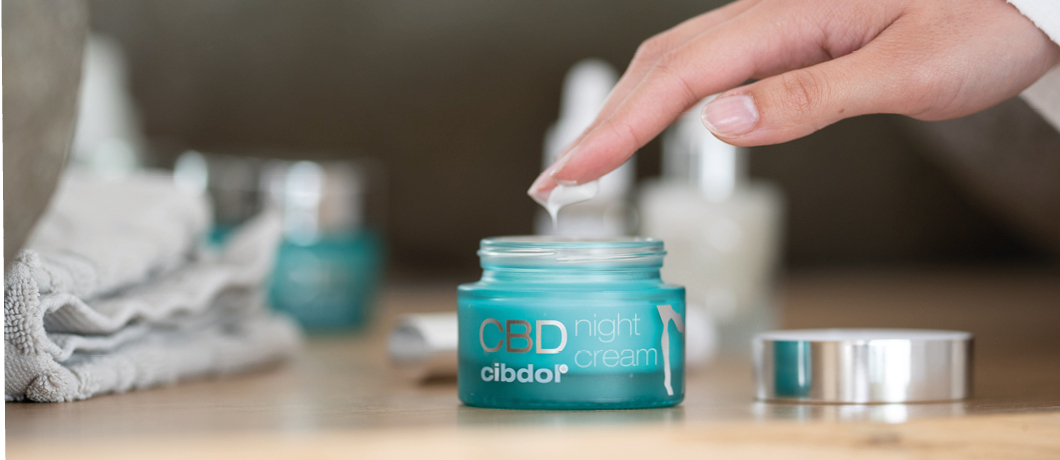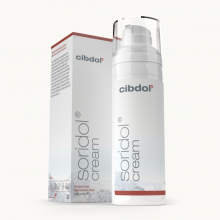How does CBD affect the skin?

As the largest organ of the body, our skin is something we all strive to look after and care for. Whether this is by using moisturising body creams, toners, and cleansers or protecting yourself from harmful UV rays with suntan lotion, there are many ways to look after your skin. However, with the popularity of CBD use constantly rising, are there potential benefits to using CBD skincare products? Let's take a look.
Contents:
Before we dive in, it's worth noting that research into the effects of CBD is still underway. As such, it's hard to make any concrete conclusions regarding CBD's impact on skin conditions or skin health in general. Yet, there are certainly promising studies and trials that are paving the way for more comprehensive research in this area.
Now, with that out of the way—what even is CBD, and what can it do to possibly benefit our skin?
What is CBD?
When we think of cannabis, our mind tends to conjure up imagery of its psychotropic properties, which are the result of the cannabinoid tetrahydrocannabinol (THC). However, there are around 113 different cannabinoids in cannabis and hemp, all with the potential to produce an effect, whether noticeable or not. After THC, cannabidiol (CBD) is the second most abundant cannabinoid found in the lion’s share of cannabis cultivars.
For many decades, CBD was not extensively studied because it was assumed to be devoid of physiological benefits. Also, its lack of psychotropic properties simply made it less interesting to researchers until very recently.
In fact, it wasn't until a few years ago that CBD products first started being available for legal purchase, despite their lack of toxicity or serious side effects. Now that CBD has been deemed safe by the World Health Organization, it is garnering huge popularity as a potential accessory to well-being.
What is the endocannabinoid system?
To understand the science behind CBD and the skin, we first need to obtain an understanding of how this cannabinoid interacts with the body.
The endocannabinoid system (ECS) is a network of receptors that works alongside other systems to maintain homeostasis (balance). Ultimately, the ECS affects processes such as memory, pain, mood, and immune response.
CBD interfaces with the ECS, although it has little binding affinity for the major cannabinoid receptors CB1 and CB2. Yet, the cannabinoid still affects the breakdown of the ECS' signalling molecules, and binds to various other receptor sites throughout the body.
In addition to stimulating the internal organs, the endocannabinoid system has many receptors in the skin.
What exactly does CBD do for the skin?
The answer to this question is multifaceted and complex. At present, numerous studies and reviews have sought to determine CBD’s potential to benefit both healthy and damaged skin cells.
CBD and inflammation
One such review[1] explored CBD's potential to suppress inflammatory cytokines and chemokines—two proteins that catalyse the inflammatory response. Without regulation, this can result in blemishes and irritated skin.
Practically everything skin-related—from daily epidermis irritation to full-blown skin conditions—is worsened by the possible inflammation these proteins cause. Thus, researchers are eager to find out if CBD can stand up to these proteins to reduce the skin’s inflammatory response.
Proper cell proliferation
Aside from inflammation, CBD has also been studied for its potential to nurture the skin by promoting proper cell proliferation and differentiation. Moreover, its potential antioxidant properties make it an intriguing ingredient for anti-ageing creams.
The effectiveness of CBD on skin conditions
While CBD has shown some promise as a potential way to soothe more or less healthy skin, how does it fare against more prominent skin conditions, such as eczema, psoriasis, and acne? This is a little more of a controversial subject of conversation. Sure, you don't have to look very hard to find anecdotal reports on CBD's effectiveness. However, large-scale clinical trials need to be carried out to determine its true scope of effects.
That said, CBD has been probed for its potential lipostatic, antiproliferative, and anti-inflammatory properties, all of which lay the groundwork for producing a positive effect on a person's skin. While this is not a cure for skin conditions such as eczema, it can level the playing field, giving the skin a few extra resources to try and normalise conditions. For this reason, each person's experience using CBD will differ from the next. Some swear by it, while others don't see much of an effect.
And it's not just eczema that is of relevance; the interactions between CBD and other skin conditions, such as acne and psoriasis, have also received numerous studies. One carried out by the Journal of Clinical Investigation tested[2] the effectiveness of CBD in treating acne.
The two underlying mechanisms that contribute to acne are inflammation and overproduction of sebum. While sebum exists to support our skin's protective qualities, too much can result in negative outcomes. The above study looked to see if CBD had the potential to make a notable reduction in inflammation associated with acne. Ultimately, results were intriguing enough to set the scene for future, more in-depth trials on the subject.
How to use CBD for the skin
There are a few different ways you can use CBD on the skin. As mentioned, CBD has risen exponentially in popularity, becoming a hugely in-demand ingredient in many skincare products. Those looking to support the skin's natural ecosystem can look to harness these products in hopes of giving their skin a boost.
However, specific CBD topical creams can be purchased by those currently dealing with eczema, acne, psoriasis, and other skin conditions. These creams have a higher CBD content and can be applied directly to the skin up to 2–3 times a day. Alongside other soothing ingredients, these CBD products can make a worthwhile addition to a daily skincare routine for sufferers of these conditions.
Using topical creams is not the only way to experience CBD, as many users looking for a long-term solution have taken to ingesting CBD oils and capsules. Consuming these products daily with other supplements, while maintaining the use of topical creams, may provide some relief through a multi-pronged interaction with the endocannabinoid system.
CBD for the skin: the takeaway
So, what does it all mean? Well, there's no denying that the future of using CBD as a means to treat skin conditions is an exciting prospect. Research and anecdotal evidence claim that CBD could potentially be of benefit to skin conditions such as eczema. It is no cure, and the results vary from person to person, but, given CBD's lack of toxicity and non-psychotropic nature, there's very little reason not to explore its full range of uses.
There is certainly potential, but more research needs to be carried out before we can make any definitive claims about using CBD for the skin. A 2018 review[3] titled “Cannabinoids in Dermatology” suggests the scope of infused beauty and healthcare products may extend to dozens of skin conditions. Regardless of how you intend to use CBD-infused skincare, it appears there may be a tailored product for you in the future—but only time will tell.
Want to try CBD oils and topical creams for yourself? Well, you can. Head over to the Cibdol store and browse our huge selection of CBD products to find one that suits your needs. Or, if you're looking to keep up to date with all things CBD, be sure to subscribe to the Cibdol newsletter and stay informed with all the latest developments. Also, feel free to browse our extensive CBD Encyclopedia for info on all things cannabinoids.
[1] Nagarkatti, P., Pandey, R., & Rieder, S. A. (2009). Cannabinoids as novel anti-inflammatory drugs. NCBI. https://www.ncbi.nlm.nih.gov/pmc/articles/PMC2828614/ [Source]
[2] Oláh, A., Tóth, B. I., & Borbíró, I. (2014). Cannabidiol exerts sebostatic and antiinflammatory effects on human sebocytes. PubMed. https://pubmed.ncbi.nlm.nih.gov/25061872/ [Source]
[3] Eagleston, L. R. M., Kalani, N. K., & Patel, R. R. (2018b). Cannabinoids in dermatology: a scoping review. PubMed. https://pubmed.ncbi.nlm.nih.gov/30142706/ [Source]
[1] Nagarkatti, P., Pandey, R., & Rieder, S. A. (2009). Cannabinoids as novel anti-inflammatory drugs. NCBI. https://www.ncbi.nlm.nih.gov/pmc/articles/PMC2828614/ [Source]
[2] Oláh, A., Tóth, B. I., & Borbíró, I. (2014). Cannabidiol exerts sebostatic and antiinflammatory effects on human sebocytes. PubMed. https://pubmed.ncbi.nlm.nih.gov/25061872/ [Source]
[3] Eagleston, L. R. M., Kalani, N. K., & Patel, R. R. (2018b). Cannabinoids in dermatology: a scoping review. PubMed. https://pubmed.ncbi.nlm.nih.gov/30142706/ [Source]








